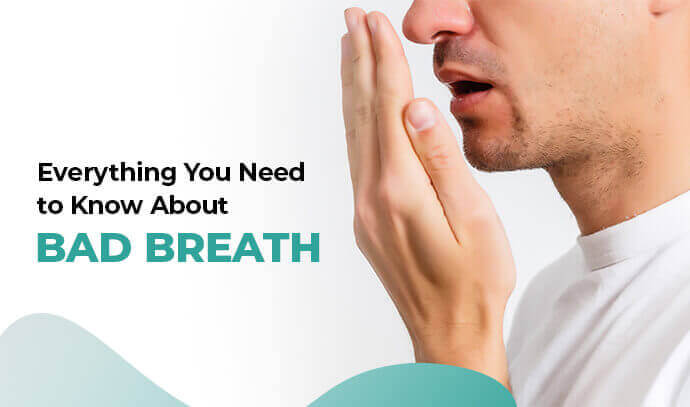
Everything You Need to Know About Bad Breath
Bad breath, also known as halitosis, is a common problem that can be embarrassing and affect your self-confidence. Approximately 25 percent of individuals experience bad breath. While various factors can contribute to halitosis, the primary culprit in most cases is poor oral hygiene.
Bad breath is a condition that affects many people, and it’s important to understand its causes, types, and treatment options. In this blog post, we’ll explore everything you need to know about bad breath. So let’s get started.
Quick facts about bad breath
Here are quick points regarding bad breath. Additional information and details can be found in the main article.
- Bad breath impacts approximately 25% of the global population.
- The leading cause of halitosis is poor oral hygiene.
- When food particles remain in the mouth, bacteria break them down, leading to sulfur compound production.
- Maintaining mouth hydration can minimize mouth odor.
- Consistent brushing, flossing, and staying hydrated are the most effective treatments for bad breath.
Cause of Bad Breath
Bad breath can have various causes, including:
- Food: Certain foods, such as garlic, onions, and spicy dishes, can contribute to bad breath. These foods release odor-causing compounds that can linger in your mouth and cause an unpleasant smell.
- Poor Oral Hygiene: Failing to brush and floss regularly can lead to the buildup of food particles and bacteria in your mouth, which can cause bad breath.
- Dry Mouth: Saliva helps wash away food particles and bacteria in your mouth. However, if you have a dry mouth, it can lead to an overgrowth of bacteria, resulting in bad breath.
- Smoking: Smoking can not only stain your teeth but also cause dry mouth, which can lead to bad breath.
- Certain Medical Conditions: Some medical conditions, such as respiratory infections, tonsillitis, diabetes, and liver or kidney problems, can contribute to bad breath.
Types of Bad Breath
There are two main types of bad breath:
- Temporary Bad Breath: This type of bad breath is usually caused by something you ate or drank recently. It typically goes away on its own once the food is digested or the odor-causing compounds are eliminated from your mouth.
- Chronic Bad Breath: This type of bad breath is more persistent and can be a sign of an underlying health issue. It may be caused by poor oral hygiene, dry mouth, or a medical condition.
Reasons for Bad Breath
In addition to the causes mentioned above, there are several other reasons why someone might experience bad breath:
- Gum Disease: Gum disease, also known as periodontal disease, can lead to bad breath due to the buildup of bacteria and plaque in the mouth.
- Tooth Decay: Cavities and other forms of tooth decay can trap food particles and bacteria, leading to bad breath.
- Dentures or Orthodontic Appliances: If not properly cleaned, dentures and orthodontic appliances can harbor bacteria and cause bad breath.
- Tonsil Stones: These are small, hardened deposits that can form in the tonsils and emit an unpleasant odor.
Symptoms for Bad Breath
While the most obvious symptom of bad breath is an unpleasant odor coming from your mouth, there are other signs to look out for:
- White coating on the tongue
- Dry mouth
- Bitter or metallic taste in the mouth
- Bad taste in the mouth
Bad Breath Treatment
Treating bad breath often involves addressing the underlying cause. Here are some common treatment options:

- Improved Oral Hygiene: Brushing your teeth twice a day, flossing regularly, and using an antibacterial mouthwash can help eliminate food particles and bacteria that cause bad breath.
- Hydration: Drinking plenty of water can help increase saliva production and prevent dry mouth.
- Dietary Changes: Avoiding foods that contribute to bad breath, such as garlic and onions, can help reduce odor.
- Quitting Smoking: Quitting smoking can improve your overall oral health and reduce the risk of bad breath.
- Treating Underlying Medical Conditions: If bad breath is caused by a medical condition, treating the underlying issue may resolve the problem.
- Professional Dental Treatment: In some cases, professional dental treatments, such as scaling and root planing, may be necessary to remove plaque and tartar buildup that contributes to bad breath.
Bad breath can be embarrassing and impact your social and professional life. By understanding the causes, types, and treatment options, you can take steps to address this issue and feel more confident in your interactions with others. Remember, regular dental check-ups and good oral hygiene practices are key to maintaining fresh breath and overall oral health.
So, if you are looking for a dental hospital in Kochi for your or your loved ones’ bad odor problems, Elite Dental Studio is here to help. We have an expert team of dentists who can examine your actual situation and give the required treatment. Book an appointment today to know more.
FAQs
What is the main cause of bad breath?
The main cause of bad breath is poor oral hygiene. When you don’t brush and floss regularly, food particles and bacteria can build up in your mouth, leading to an unpleasant odor.
Can certain medical conditions cause bad breath?
Yes, certain medical conditions like respiratory infections, tonsillitis, diabetes, and liver or kidney problems can contribute to bad breath. If you have chronic bad breath, it’s a good idea to visit your doctor to rule out any underlying health issues.
Is bad breath always a sign of something serious?
No, bad breath isn’t always a sign of something serious. Sometimes, it’s just temporary and caused by something you ate or drank recently, like garlic or onions. As long as it goes away after a while, it’s usually nothing to worry about.
What are some effective ways to treat bad breath?
Some effective ways to treat bad breath include practicing good oral hygiene (brushing, flossing, and using mouthwash), staying hydrated, avoiding foods that cause bad breath, quitting smoking, and treating any underlying medical conditions. In some cases, professional dental treatment may be necessary.
Can bad breath affect my social life?
Yes, bad breath can definitely affect your social life and self-confidence. It can be embarrassing and make it difficult to interact comfortably with others. That’s why addressing the issue and finding an effective treatment is important.
Have Dental Problem : Call us
CALICUT: +91 9745 072 555,
KOCHI: +91 9567 124 888
KANNUR: +91 9645874777
or make an Appointment
Take a smiling selfie and we'll Simulate your new smile See What Invisalign treatment could do for you!




